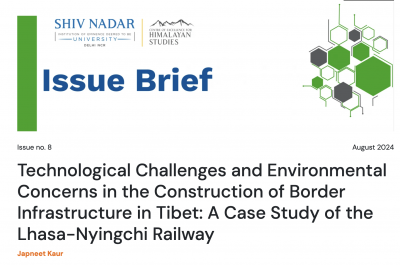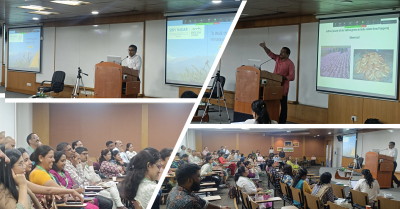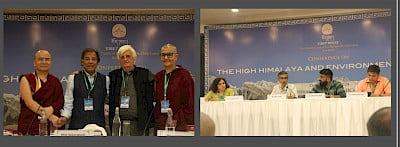Number 9
HIMALAYAS PLUS
JULY-AUGUST 2024
Dear Friends,
Greetings from the Centre of Excellence for Himalayan Studies, Shiv Nadar Institution of Eminence, Delhi NCR (SNIoE). We are delighted to present the 9th edition of our Newsletter for July and August 2024. This and previous Newsletters are also available on our website.
PUBLICATIONS
In our latest Issue Brief, Ms. Japneet Kaur, Research Associate at the SNIoE, examines the technological and environmental challenges in infrastructure building in border areas in Tibet, through a case study of the Lhasa-Nyingchi segment of the Sichuan-Tibet railway. The study is part of a larger inter-disciplinary research project on ‘Earth Observation of Development Activities in the Hindu Kush Himalaya Region and their Impacts on Natural as well as Human Landscapes: Transnational Case Studies’, undertaken by three faculty members at the University, including CHS Director, Dr. Jabin T. Jacob.

Dr. Padma Ladon, who was recently awarded her PhD in Environmental Science from Jawaharlal Nehru University, New Delhi, authored a Commentary on agropastoralism in the Trans-Himalayan zone of Leh-Ladakh that examines grazing management strategies and socio-environmental influences on traditional pastoral lifestyles.
The Centre has been translating its publications into languages spoken widely in the Himalayan region, to expand accessibility to our cutting-edge analyses. Two Commentaries by Dr. Jabin T. Jacob – on the need for India to be pro-active on China, and on a recent speech by Dorjee Tshering Lepcha, Rajya Sabha MP from Sikkim were translated into Tibetan. The latter piece was also translated into Nepali. A co-authored piece by CHS Associate Fellow, Dr. Devendra Kumar, and Fellow, Dr. Anand P. Krishnan, on Russian President Vladmir Putin’s visit to China in May this year, was also translated into Tibetan. Over the last few months, we have had translations in Chinese, Nepali, Tibetan, and Urdu.
Our researchers also contribute to other platforms, and you can find a selection of these writings on the CHS website.
We welcome writing/publications from scholars, practitioners, and members of the strategic community working on the wider Himalayan region around four broad themes: borders and identities, economy, environment and geopolitics. However, we are open to ideas and suggestions on other areas of interest. Those interested may get in touch with us on our email [email protected]. For more information, please visit our website.
EVENT
On 27 August, CHS conducted a quiz - ‘A Walk Through the Himalayas’ - for school counsellors and teachers from across India participating in a 3-day session at Shiv Nadar IoE, on the sidelines of the Annual Conference and Expo of the International Career and College Counselling Movement. CHS Fellow, Dr. Anand P. Krishnan, wore the hat of the quizmaster.

IN THE MEDIA
CHS Director, Dr. Jabin T. Jacob, penned a piece for the Deccan Herald, where he analyzed the speech of Dorjee Tshering Lepcha, Rajya Sabha MP from Sikkim, examining concerns over the region’s economy, employment and infrastructure. Dr. Jacob gave interviews to India Today Global exploring whether India needed a (new) strategy vis-à-vis China, and to the India Writes Network on the prospects of a thaw in India-China relations. He also spoke on China’s economic slowdown in another interview on Doordarshan India.
Dr. Jacob was quoted by The Print on China’s role as mediator in global conflicts. He also shared his views in Nikkei Asia, on China’s engagement with the new interim administration in Bangladesh following the students-led movement and ouster of Prime Minister Sheikh Hasina.
CHS Distinguished Fellow, Mr. Claude Arpi, wrote three articles for Firstpost. In the first one, he discussed the relevance of the Five Principles of Peaceful Coexistence or Panchsheel – whose 70th anniversary was commemorated in China recently – which he noted that the Chinese had disrespected in relation to Tibet and the border problems with India. The second piece analyzed the Resolve Tibet Act passed by the US Congress in February this year, China’s response to it, and how India remains key to any solution that emerges. The final piece examined the erroneous use of Xizang for Tibet by the Chinese Party-state, illustrating the deliberate misuse of history.
Mr. Arpi also authored two pieces for the Deccan Chronicle. The first of these called for Indian parliamentarians to take an active interest and enhance their engagement on Tibet. The other one analyzed how environmental degradation and fragility of the Himalayan region was exacerbated by rising militarization by China. He also appeared on Natstrat, to discuss the possible emergence of the next Dalai Lama from India and how China might respond to it.
CHS Associate Fellow, Dr. Devendra Kumar contributed a piece for the Jamestown Foundation’s China Brief, on the Communist Party of China’s (CPC) concerted focus on building Economic and Technological Zones to power their economic strategy in Tibet. This article was also extensively quoted in a report by Radio Free Asia. He also wrote for The Strategist published by the Australian Strategic Policy Institute, on the extension of Xi Jinping’s anti-corruption programme to China’s manned space agency. In a commentary for Deccan Herald, he parsed the Communiqué issued after the Third Plenum of the CPC’s 20th Central Committee.
FACULTY UPDATE
CHS Director, Dr. Jabin T. Jacob delivered a lecture on ‘China’s Economic Growth and its Influence on the Internal Affairs of Other Countries’, at the Maritime Warfare Centre, Eastern Naval Command, Visakhapatnam on 26 July. He was also a panelist at a discussion organized by Observer Research Foundation, New Delhi on 29 August on the CPC 20th Central Committee’s Third Plenary session.
Prof. Kaveri Gill, Non-Resident Senior Fellow at the CHS, was the convenor of a Conference on ‘The High Himalaya and Environmental Justice’, organized by the Tibet House, New Delhi on 14 July. Other faculty members from CHS were also part of this event. Distinguished Fellow, Prof. Siddiq Wahid, spoke on ‘Environmental Justice and Political Economy – The Case of the High Himalaya’, while Mr. Claude Arpi, made a presentation on ‘Himalaya without Borders – Environmental Concerns’. Associate Fellow, Dr. Devendra Kumar presented a paper on ‘Agriculture Development and Reforestation in Ngari Prefecture in Western Tibet’.

Prof. Gill also contributed a chapter titled ‘Courts and Solid Waste Management in Urban Areas’, in The Oxford Handbook of Environment and Natural Resources Law in India, published by Oxford University Press. Its conclusions have implications also for urban settlements in India’s Himalayan region.
CHS Distinguished Fellow, Mr. Claude Arpi was one of the speakers at the launch of the book, Imperial Games in Tibet: The Struggle for Statehood & Sovereignty, by Amb. Dilip Sinha, and published by Pan Macmillan. He was also among the panelists discussing the book at the Vivekananda International Foundation, New Delhi. Mr. Arpi gave a talk on ‘Tibet – Impacts of Sinicization and the Feasibility of Leveraging Tibet during India-China Conflict’, at the Naval War College in Goa. He also spoke on ‘India and Tibet: Historical Perspective – Scenario Post Chinese Invasion’, as part of a Tibetology course, at Tenga, Arunachal Pradesh.
Dr. Anand P. Krishnan was the moderator of a panel discussion on ‘The Third Plenum and After: Understanding the Economic, Political and Ideological Messaging for China and the World’, organized by the Institute of Chinese Studies, Delhi held on 21 August.
You can stay updated with our publications, events, and activities through our website, X (@Himalayas_SNU), Facebook, and LinkedIn. We welcome your feedback and appreciate your continued support.
Share this: